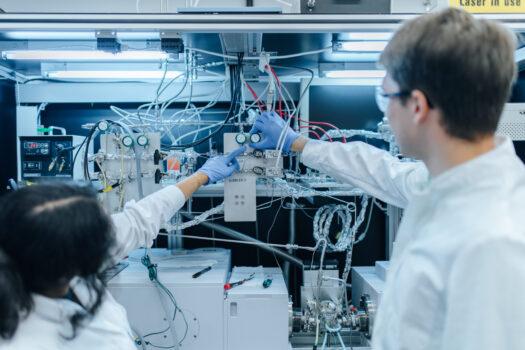Molecular Science (B.Sc.)
Molecular Science (B.Sc.)

The bachelor’s degree program in Molecular Science is offered in German only.
- Degree
- Bachelor of Science (B.Sc.)
- Duration of studies in semester
- 6
- Start of degree program
- Winter semester
- Study location
- Erlangen
- Number of students
- 50-150
- Subject group
- Mathematics, Natural sciences
- Special ways to study
- 1-subject Bachelor
- Teaching language
- completely in German
- Admission Requirements
- No Admissions Restrictions
- Keywords
- Chemistry, Life Science, Nanomaterials
What is the degree program about?
Molecular Science is an interdisciplinary, chemical-scientific field of study that, in addition to the focus on chemistry, also includes content from materials science and technology or medicine, pharmacy and biology. After basic training in the classical disciplines of inorganic chemistry, organic chemistry, physical chemistry, theoretical chemistry and biochemistry, you can specialize in one of the fields of Molecular Life Science or Molecular Nano Science in the third year of study.
In Molecular Nano Science, you will be involved in the development of new, molecular materials for materials science and engineering. You will be introduced to technologically significant classes of materials, such as conducting organic compounds or inorganic and organic solar cells, by learning the fundamentals of physics and chemistry. The focus is on properties, targeted synthesis and characterization of molecular architectures as well as in-depth understanding and practical application of spectroscopic analysis methods.
In Molecular Life Science, the thematic focus is in the direction of pharmacy and molecular biology and should, among other things, also enable you to make a lateral entry into the field of mechanisms of action and drug design. For this purpose, you will learn basic principles from the fields of biochemistry, microbiology, medicinal chemistry, food chemistry and plant physiology. An important aspect here is also the integration of modern, computer-assisted structure search and structure optimization methods.
-
- 1.-4. Semester: Basic education
In the fundamental stage, the basic knowledge of chemical structures and reactivity is taught, as well as the most important experimental techniques. In the first semester, the basic training begins with modules in general chemistry and the minor subjects of mathematics and experimental physics. The latter lay the foundations for scientific thinking. In the second semester, mathematics is replaced by theoretical chemistry, while organic and physical chemistry are added to inorganic chemistry. In the third and fourth semesters, toxicology and legal studies are on the schedule in addition to in-depth lectures in the chemical disciplines. In addition, you will gain in-depth knowledge in the field of biochemistry and molecular biology. - 5th – 6th semester: Deepening and profiling
The third year of study is used for specialization and profile building. Here you can choose either Nano Science or Life Science as a specialization. Nano Science includes courses in physical chemistry, computational nanoscience and spectroscopy, while Life Science focuses on biological and medicinal chemistry. - 6th semester: Bachelor thesis
The bachelor thesis is usually written in the 6th semester. The thesis is intended to prove that you are able to independently work on a problem from the field of chemistry within a given period of time using the subject-specific scientific methods and to present the results in an appropriate manner.
- 1.-4. Semester: Basic education
-
- Admission requirements (first semester)
- No Admissions Restrictions
- Application deadline winter semester
-
30.09.
- Details and notes
-
The application deadline for the winter semester for international applicants is July 15th.
The bachelor’s degree program in Molecular Science is offered in German only.
In addition to the general qualification for university entrance (Abitur), there are other access options for studying at FAU.
Do you need help or more information?
Our Student Advice and Career Service (IBZ) is the central point of contact for all questions about studying and starting a degree programme. Our Student Service Centres and subject advisors support you in planning your studies.